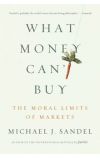
30 May 2013 02:33:34
Some things, such as love and money, don't need defending from the market because you can never buy the real McCoy, only surrogates or introductions that might lead you to them. Sandel is more worried about the things that can be traded without being completely destroyed, but at the price of becoming somehow degraded or tarnished. What was lost, for example, when Newcastle United's historic St James' Park stadium was renamed after its sponsor? What is the effect on human dignity and equality when you can buy human organs, which the poor have many more incentives to sell than the rich?
Sandel is a deceptively clear writer, making often subtle and complex philosophical ideas so straightforward that they almost appear obvious. Still, even he can't say where lines in the sand ought to be drawn. Why feel queasy about renaming sports stadiums, for example, when trophies and team shirts have carried sponsors' names and logos for years? But perhaps it's a mistake to look for such lines. The concern is not that any particular incursion of the market is in itself pernicious. The harm, rather, is cumulative: the more market thinking comes to dominate life, the more it infects our ways of thinking, crowding out values such as loyalty, civic duty and altruism.
Sandel's argument would be more balanced if he had acknowledged the ways in which some areas of human life have become less market-driven. It's been a long time, for example, since people effectively paid for their spouses with dowries. Nonetheless, Sandel has raised a much-needed alarm, and even if how we respond to it may not be clear, respond we must. To do so, Sandel argues we need a serious public debate about what values we want our politics to build and defend. That means dropping the illusion that politics is about no more than efficient management of the economy: it's about nothing less than competing visions of the good society.

